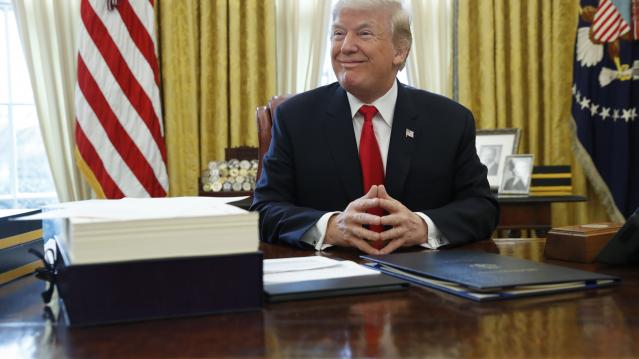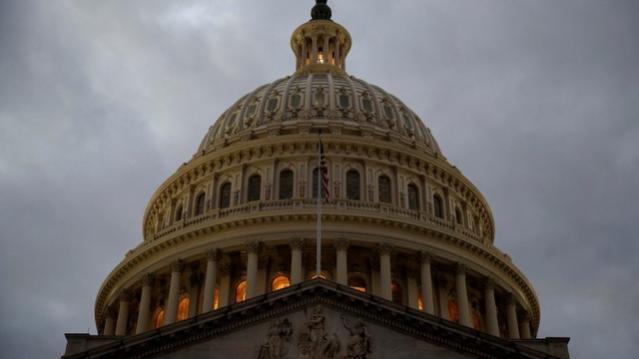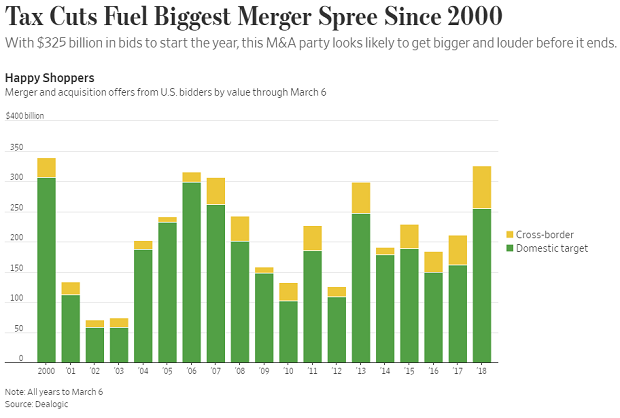Cruz Won’t be Trumped—Watch Him Cook Bacon on a Machine Gun

Sen. Ted Cruz (TX) has shown an affinity for breakfast foods he did, after all, famously read "Green Eggs and Ham" on the Senate floor. Now, the Texas senator is the latest Republican presidential contender to ham it up in a stunt video released Monday—this time, he separates himself from the pack by cooking bacon with a machine gun.
“Few things I enjoy more than on weekends cooking breakfast with the family. Of course in Texas, we cook bacon a little differently than most folks," Cruz says in a video. Cruz walks the viewer through the rather unique cooking process, including wrapping strips of bacon around the gun’s nozzle and encasing it in aluminum foil to keep in the heat.
Cruz himself fires off several rounds at a gun range. After he’s finished, and gotten grease all over the cement floor, he uses a fork to pick a piece of still sizzling meat off the barrel and eats it.
“Mmm. Machine gun bacon,” the senator says with a smile before chuckling.
The 66-second clip comes roughly two weeks after Sen. Lindsey Graham (R-SC), another White House hopeful, shot his own video where he used a variety of methods to destroy cellphones after he had his phone number given out by GOP frontrunner Donald Trump.
The video is sure to bounce around the web and get people talking about Cruz’s candidacy just as the Republican field gets ready to take the stage for its inaugural debate.
An NBC/Wall Street Journal poll released on Sunday showed the Texas lawmaker taking fifth in the GOP primary race, with 9 percent support. That put him 10 points behind current polling leader Donald Trump. Cruz also trails Wisconsin Gov. Scott Walker, former Florida Gov. Jeb Bush and neurosurgeon Ben Carson, according to the survey, meaning that the bacon stunt can't hurt: His campaign could definitely use more sizzle.
Top Reads from The Fiscal Times:
- Joe Biden: The Looming Threat to a Republican Presidency
- Trump’s Net Worth Isn’t His Only Claim That’s Fake
- Why the Six Candidates Left Out of the GOP Debate Might Be Winners After All
Chart of the Day: A Buying Binge Driven by Tax Cuts
The Wall Street Journal reports that the tax cuts and economic environment are prompting U.S. companies to go on a buying binge: “Mergers and acquisitions announced by U.S. acquirers so far in 2018 are running at the highest dollar volume since the first two months of 2000, according to Dealogic. Thomson Reuters, which publishes slightly different numbers, puts it at the highest since the start of 2007.”
Number of the Day: 5.5 Percent

Health care spending in the U.S. will grow at an average annual rate of 5.5 percent from 2017 through 2026, according to new estimates published in Health Affairs by the Office of the Actuary at the Centers for Medicare and Medicaid Services (CMS).
The projections mean that health care spending would rise as a share of the economy from 17.9 percent in 2016 to 19.7 percent in 2026.
Trump Clearly Has No Problem with Debt and Deficits

A self-proclaimed “king of debt,” President Trump has produced a budget that promises red ink as far as the eye can see. With last year's $1.5 trillion tax cut reducing revenues, the White House gave up even trying to pretend that its budget would balance anytime soon, and even the rosy economic projections contained in the budget couldn’t produce enough revenues, however fanciful, to cover the shortfall.
The Trump budget spends as much over 10 years as any budget produced by President Barack Obama, according to Jim Tankersley of The New York Times. And it projects total deficits of more than $7 trillion over the next decade — "a number that could double if the administration turns out to be overestimating economic growth and if the $3 trillion in spending cuts the White House has floated do not materialize in Congress,” Tankersley says.
Trump — who once promised to both balance the budget and pay down the national debt — isn’t the only one throwing off the shackles of fiscal restraint. Republicans as a whole appear to be embracing a new set of economic preferences defined by lower taxes and higher spending, in what Bloomberg describes as a “striking turnabout” in attitudes toward deficits and the national debt.
But some conservatives tell Tankersley that the GOP's core beliefs on spending and debt remain intact — and that spending on Social Security and Medicare, the primary drivers of the national debt, are all that matters when it comes to implementing fiscal restraint.
“They know that right now, a fundamental reform of entitlements won’t happen," John H. Cochrane, an economist at Stanford University’s Hoover Institution, tells Tankersley. "So, they have avoided weekly chaos and gotten needed military spending through by opening the spending bill, and they got an important reduction in growth-distorting marginal corporate rates through by accepting a bit more deficits. They know that can’t be the end of the story.”
Democrats, of course, have warned that the next chapter in the tale will involve big cuts to Social Security and Medicare. Even before we get there, though, Tankersley questions whether the GOP approach stands up to scrutiny: "This is a bit like saying, only regular exercise will keep America from having a fatal heart attack, so, you know, it's ok to eat a few more hamburgers now."
Part of the Shutdown-Ending Deal: $31 Billion More in Tax Cuts

Margot Sanger-Katz and Jim Tankersley in The New York Times: “The deal struck by Democrats and Republicans on Monday to end a brief government shutdown contains $31 billion in tax cuts, including a temporary delay in implementing three health care-related taxes.”
“Those delays, which enjoy varying degrees of bipartisan support, are not offset by any spending cuts or tax increases, and thus will add to a federal budget deficit that is already projected to increase rapidly as last year’s mammoth new tax law takes effect.”
IRS Paid $20 Million to Collect $6.7 Million in Tax Debts

Congress passed a law in 2015 requiring the IRS to use private debt collection agencies to pursue “inactive tax receivables,” but the financial results are not encouraging so far, according to a new taxpayer advocate report out Wednesday.
In fiscal year 2017, the IRS received $6.7 million from taxpayers whose debts were assigned to private collection agencies, but the agencies were paid $20 million – “three times the amount collected,” the report helpfully points out.
Like what you're reading? Sign up for our free newsletter.

